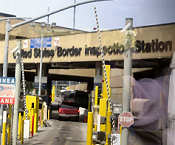 Two men, one in Texas and one in New Jersey, have pleaded guilty to violations of 18 U.S.C. § 554 in connection with a scheme where the New Jersey man provided false NAFTA certificates of origin to the Texas man, who then used them to export non-U.S. textiles to customers in Mexico. Obviously, the purpose of this scheme was to defraud Mexico of duties that otherwise would have been due on the textile imports if it had been disclosed that they weren’t U.S.-origin goods.
Two men, one in Texas and one in New Jersey, have pleaded guilty to violations of 18 U.S.C. § 554 in connection with a scheme where the New Jersey man provided false NAFTA certificates of origin to the Texas man, who then used them to export non-U.S. textiles to customers in Mexico. Obviously, the purpose of this scheme was to defraud Mexico of duties that otherwise would have been due on the textile imports if it had been disclosed that they weren’t U.S.-origin goods.
This, of course, is a very, very, very bad thing. Particularly so far as the Mexicans are concerned. And there ought to be a law, as they say. But that law isn’t 18 U.S.C. § 554. Since nobody involved in the prosecution or investigation of the two men appears to have read the law, let’s do something novel and actually read it:
Whoever fraudulently or knowingly exports or sends from the United States, or attempts to export or send from the United States, any merchandise, article, or object contrary to any law or regulation of the United States, or receives, conceals, buys, sells, or in any manner facilitates the transportation, concealment, or sale of such merchandise, article or object, prior to exportation, knowing the same to be intended for exportation contrary to any law or regulation of the United States, shall be fined under this title, imprisoned not more than 10 years, or both.
I’ve added the emphasis to the statutory text so that you can easily see that section 554 cannot be violated on its own but requires that another federal law or regulation be violated. So what U.S. statute is violated when the fake NAFTA certificate is presented to Mexican customs officials? Nothing on the CPB form for the NAFTA Certificate of Origin references any laws that would be broken by false statements on the form.
Certainly, there was no violation of 19 U.S.C. § 1592 because that statute only applies to false statements to U.S. Customs made in connection with imports into the United States. Even if somehow or another section 1592 applied in this case, violation of the statute results in civil penalties but does not make the exportation itself contrary to law as required for a violation of section 554. That argument applies as well to 18 U.S.C. § 1001 which criminalizes certain material misrepresentations in certain government documents: that statute doesn’t make the export of the goods illegal.
Nor is the identity of the other law required for a violation of section 554 revealed in the court documents released in this case. That other necessary law isn’t mentioned or referred to in the criminal information, in the plea agreement for the New Jersey defendant, or in the plea agreement for the Texas defendant. Only 18 U.S.C § 554 is mentioned in those three documents. In short, the two men were prosecuted for, and plead guilty to, violating a law that they simply didn’t violate and couldn’t legally have violated.
One has to wonder whether the attorneys for the two defendants did anything in this case other than take their fees and assure the defendants that they got a good deal from the prosecution. The lesson here, for defense attorneys and prosecutors alike, is that just because something ought to be against the law doesn’t mean that it actually is against the law. That’s one of the things you were supposed to have learned in law school.
UPDATE: Stu Seidel now at Baker & McKenzie (and before that having a long and distinguished career at Customs) points out in comments that the fake certificate would in fact violate 19 U.S.C § 1592(f) which prohibits false statements in NAFTA certificates on exported goods. However, like section 1592(a) the provision doesn’t make the exportation illegal, rather it imposes civil penalties for violations. Since it doesn’t make the export unlawful but only the certification unlawful it cannot stand as a predicate statute for a violation of section 554. Similarly 19 C.F.R. § 181.81, cited by Stu, can support a penalty for the false certification but not a finding that the export is illegal. Neither section 1592(f) nor 19 C.F.R. § 181.81 were cited by the information or the plea agreement as the predicate statutes for the charged violation of section 554.
 Permalink
Permalink
Copyright © 2009 Clif Burns. All Rights Reserved.
(No republication, syndication or use permitted without my consent.)

 Posted by
Posted by  Category:
Category: 

